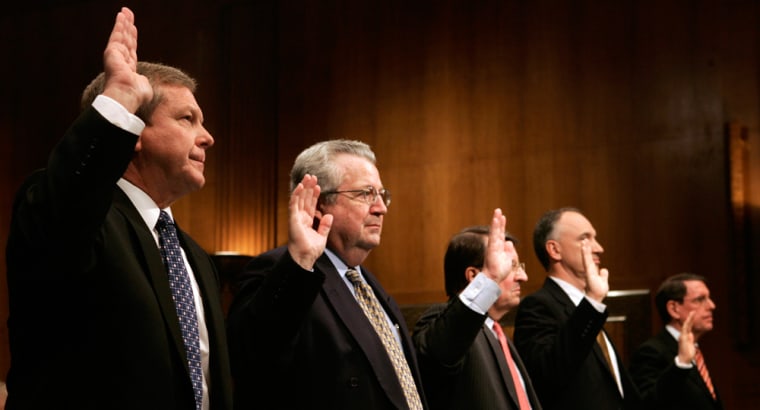Since regular people are scrimping to pay for gasoline to go to work, Sen. Patrick Leahy wanted to make it personal for the men of Big Oil.
How much money did you make last year? the Vermont Democrat asked the top executives of the country’s five biggest oil companies. They had been summoned to a Senate hearing to explain the extraordinarily high cost of oil and gasoline and their companies’ profits.
Three executives said their compensation was in the millions. Two said they didn’t know.
“I wish I made enough money that I didn’t know how much I make,” replied Leahy with no intention of hiding the sarcasm.
It was a tone that dominated the oil executives’ appearance Wednesday before the Judiciary Committee, a panel that Leahy chairs.
It was the second time this year that the executives of Exxon Mobil Corp., Chevron Corp., BP America Inc., ConocoPhillips Co. and Shell Oil Co. had been summoned to testify before Congress. When they came in early April oil cost about $98 a barrel. On Wednesday, it bounded past $134 a barrel for a time and gasoline cost a national average of $3.80 a gallon.
The executives, whose companies reported $36 billion in profits during the first three months of the year, wanted to talk about tight supplies and growing global demand. They said that while the companies made billions of dollars, they also spent billions to find and produce more oil.
But senators complained the executives were trying to come across as “hapless victims” while raking in record profits. They wanted to press the executives about public anguish over paying $60 or more to fill up a car’s gas tank.
“Where is the corporate conscience?” Sen. Dick Durbin, D-Ill., asked.
“People we represent are hurting, the companies you represent are profiting,” Leahy told the executives. He said there’s a “disconnect” between legitimate supply issues and the oil and gasoline prices motorists are seeing.
Sitting shoulder to shoulder in the hearing room, the oilmen said they understood people were hurting, but they tried to blunt the emotion with economic analysis.
“The fundamental laws of supply and demand are at work,” said John Hofmeister, chairman of Shell Oil Co., acknowledging it is something the oil industry has been saying for some time and that the explanation may sound “repetitive and uninteresting.”
Profits have been huge “in absolute terms,” conceded J. Stephen Simon, executive vice president of Exxon Mobil Corp., but they “must be viewed in the context of the massive scale of our industry.” And high earnings “in the current up cycle” are needed for investments in the long term, including when profits will be down.
“’Current up cycle,’ that’s a nice term when people can’t afford to go to work” because gasoline is costing so much, replied Leahy with sarcasm.
The exchanges got personal with Leahy wanting to know how much the executives earned last year.
It’s $12.5 million in total compensation, said Simon, the Exxon executive.
John Lowe, executive vice president of ConocoPhillips Co., said he didn’t recall his total compensations, nor did Peter Robertson, vice chairman of Chevron Corp. Hofmeister said his was “about $2.2 million” and not among the top five salaries at his company’s international parent. Robert Malone, chairman of BP America Inc., put his “in excess of $2 million.”
The executives said restrictions on U.S. oil and gas development is adding to the tight supplies and that they’re worried about being targeted for possible new taxes.
“I urge you to resist these punitive policies,” said Hofmeister.
It was not what many senators wanted to hear.
You have “just a litany of complaints that you’re all just hapless victims of a system,” Sen. Dianne Feinstein, D-Calif., told the executives. “Yet you rack up record profits ... quarter after quarter after quarter.”
One senator after another cited the pain that high energy prices are causing farmers, small businesses and people trying to find a way to afford a vacation trip this summer.
“Is there anybody here that has any concerns about what you’re doing to this country with the prices that you’re charging and the profits that you’re taking?” Durbin asked.
The titans of America’s oil industry sat quietly for a moment.
“Senator,” replied Exxon’s Simon, “We have a lot of concern about that. And we’re doing all we can to put downward pressure on prices.”
